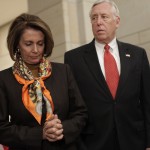The Dems' (Last Minute) Estate Tax Gamble
 The Dems had two years to craft an estate tax plan. Why then wait until the last moment to make the issue their tax policy line in the sand?
The Dems had two years to craft an estate tax plan. Why then wait until the last moment to make the issue their tax policy line in the sand?
The Democratic members of the House of Representatives are upset that the negotiations between the President and the Republican leadership will result in the reinstatement of a death tax in 2011 with a maximum 35% tax rate rather than a maximum 45% tax rate.
The 35% rate would start on taxable estates valued at $5 million while the higher 45% proposal would apply to taxable estates valued at $3.5 million. But how did this issue become the final Democratic sticking point after all the fights over the extension of the tax cuts, the AMT patch for 2010, the annual extension of other tax breaks and the host of earmarks that were stuffed into the compromise? (Think ethanol credits and subsidies for investment in American Samoa.) No matter how one feels about any of the tax compromise, are the Democrats being serious here?
For nine years, tax law called for a zero estate tax rate for 2010. During the last two years, the Democrats had overwhelming majorities in the House of Representatives and the United States Senate and nothing happened with respect to the estate tax. It effectively died on January 1, 2010 for all of 2010. As a result of this Congressional inaction, how many billionaires passed away during 2010 and paid no death taxes? How much federal tax revenue would have been garnered if the Democrats had fixed the "problem" of a zero percent death tax when they had those overwhelming majorities?
Both left and right have lots of reasons to hate the Obama/Republican tax cut proposal. Maybe that makes the tax bill plan a true compromise. The only thing certain is that if the Democrats had acted upon the estate tax during their period of congressional control, the 35% tax rate starting at $5 million would not be part of the compromise package.
Hopefully, Rep. Camp, the incoming Chairman of the House Ways & Means Committee, will step up to the plate and we will not face deadlines requiring last minute tax compromises for the next few years. Wouldn't hearings on tax policies and specific tax issues be a welcome change rather than last minute deals and compromises (not matter which side the debate one is on)?